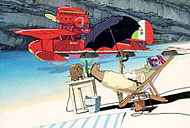
Porco Rosso
Art is not a sledgehammer. Now this might seem like a silly statement, but it is becoming necessary as we watch films in the 90s that try to make a statement. Most films with a message essentially telegraph what we are supposed to feel--it's in plain, bold lettering that can't be missed. A few good films--some recent entries such as David Fincher's Fight Club and David Russell's Three Kings--have artistic merit and even basic moral premises, but those premises are delivered in a manner subtle enough to miss if you're not paying attention. What's even more important is that art can be fun without being mindnumbingly violent or involving black-as-night comedy (which the aforementioned films use in spades). Porco Rosso is that kind of art--fun, refreshing, light-hearted, and yet delving into deep issues of the heart that cannot be explained away easily.
Porco Rosso translates as "The Crimson Pig", and that's who the story is about. The setting is in the late 1920s Italy, as fascism was becoming the religion of the politicos and the reminders of WWI were just starting to fade. Marco, a middle-aged fighter pilot who thwarts the plans of various nefarious (and often humorous) seaplane pirates, has a bit of a unique look...he is, essentially, a pig. He's well-known and respected by those in the know, though the gangs of pirates want him finished. He has a deep friendship with Gina, a woman who runs her own establishment vaguely reminscent of Rick's American Cafe in Casablanca, and she provides a romantic Roxanne to his Cyrano. But unlike Cyrano, it turns out that Marco is a pig of his own will...but that's a ways into the story. As with other films of its caliber, I will leave the plot to be found during the film itself. Really, it's a voyage of discovery in some ways, and the plot is simple enough that one might get a simpler view than necessary of the picture.
Why Porco Rosso succeeds is that it works on a variety of levels. Certainly, children would get a kick out of it--it is viceral in the same manner as Miyazaki's Laputa: Castle In The Sky and has a good amount of comedy--but it weaves more adult themes in well. It also leaves certain motivations and characterizations hanging. When I say this, I don't mean that Miyazaki left anything unresolved, but he preserves a sense of mystery throughout the proceedings. Nothing is ever completely solved, but things are wrapped well, and one tends to like the movie more as it progresses. At first, I nearly thought I had a Miyazaki film I wouldn't like...but that's my own fault, and within the first half hour I was hooked. I was also impressed that Miyazaki showed his ability to make a film that wasn't directed specifically at children. In interviews, Miyazaki has mentioned that he feels just a little guilty about Porco Rosso because it was his "pleasure" film, just for himself. Thankfully, Miyazaki's pleasure is also ours, and the layered effect of emotion and drama placed within a comedic setting works very well. If Princess Mononoke is the logical progression from here, I'm excited for its release.
Porco Rosso -- mild violence, mild language -- A

